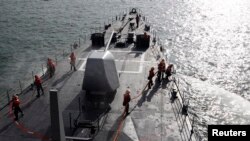The United States announced Wednesday its intent to make a landmark sale of advanced weapons to Taiwan. The Department of State’s notification to Congress of its plans met with jubilation in Taipei, which relies mostly on U.S. support for defense against its much larger rival China. But Beijing expressed outrage at the proposal.
The U.S. plans to sell Taiwan two guided missile frigates, 36 amphibious assault vehicles and more than 1,200 missiles. They are part of an arms package worth $1.83 billion. The U.S. Congress has 30 days to review the proposed sale. Taiwan president Ma Ying-jeou expressed thanks and approval, while his foreign ministry issued a statement welcoming the sale. Taiwan’s opposition party also expressed support.
But China’s deputy foreign minister summoned a U.S. envoy in Beijing to express stern opposition. China sees self-ruled Taiwan as part of its territory and has asked the rest of the world to avoid selling weapons to the island. China, however, is not expected to retaliate against the United States long term. Senior Taiwan legislator Tsai Chin-lung said Beijing knows the island still wants peaceful ties.
Tsai said stability and peace in Taiwan-mainland China relations is a common goal. He said Taipei is not getting ready to start a war, just protecting Taiwan's safety. So, he explained, although there is some talk by China, it will not go as far as an extreme action that lays a foundation later for something more serious.
China suspended military and security cooperation with the United States after a $6.4 billion arms sale to Taiwan in 2010. Washington, which also seeks to work with Beijing on economic cooperation, climate control and global security issues, had not approved new arms sales to Taipei until this week. Taiwan in turn has started to build its own weapons systems. Its military ranks as the world's 15th most powerful compared to China, which is in third place.
China and Taiwan have been separately ruled since the Chinese civil war of the 1940s. Chiang Kai-shek's Nationalists fled to Taiwan after losing to the Communists. The two sides have made strides in getting along peacefully since 2008, but Beijing has never renounced its threat to use force against Taiwan, if necessary.
Political analysts say the U.S. government timed the announcement of the $1.83 billion arms sale to avoid a backlash from Beijing. It came after Chinese President Xi Jinping's upbeat trip to the United States in September and a ceremonial first-ever meeting between Xi and Taiwan's president last month.
But the arms sale also comes less than a month before Taiwanese voters pick a new president. President Ma must step down due to term limits next year, and his Nationalist Party is trailing in opinion polls against an opposition candidate who takes a more guarded view on ties with China than the current government.
Analysts say the U.S. government did not intend for the arms sale to boost the ruling party's election odds. The U.S.-Taiwan Business Council on Wednesday called the sale a signal to China that the United States has a stake in Taiwan's peaceful transfer of power and that it supports Taiwanese democracy.










